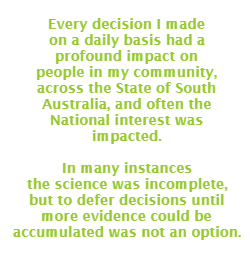Drought in Hindsight: Government Leader
Meet the Hon Karlene Maywald

During the worst drought on record in South Australia, The Hon Karlene Maywald contributed to progressing national reforms to managing the Murray Darling Basin in Australia and was South Australia’s Minister for Water Security and the River Murray from 2004 to 2010.
Karlene has also served as the Chair of the National Water Commission in Australia. Today she is the Managing Director of Maywald Consultants Pty Ltd, providing water policy and government relations advisory services.
Q: Where were we you living toward the end of the Millennium Drought (specifically 2006-2009)?
A: Waikerie, South Australia.
Q: What kinds of work did your role involve during the end of the Millennium Drought (specifically 2006-2009)?
A: The kinds of work I was undertaking included managing South Australia’s water supplies during critical water shortages, which included:
- Construction of a 100 gigalitre (GL) desalination plant ($1.8 billion) and irrigation and stock and domestic pipelines ($120 million).
- New regional water treatment plants and modifications to existing pumping infrastructure to manage diminishing water levels and water quality.
- A range of wastewater and stormwater reuse projects.
- Emergency infrastructure to prevent acidification of lakes and riverine floodplain areas with exposed acid sulphate soils.
- Negotiation of interim drought water sharing rules with upstream states including access to dams for storage of carry over water.
- Development and commencement of implementation of Water for Good – a strategic plan to secure SA water supplies to 2050 and beyond.
As the South Australia Minister I was responsible for implementation of major state and national water reforms for:
- Negotiations to establish the Murray Darling Basin Authority and the Water Act 2007.
- Establishment of water titles separate from land to enable water trade.
- Successfully negotiated the establishment of water trading across state boundaries.
- The Living Murray – a program to restore 500GL to the environment over five years.
- Introducing SA to independent regulation of urban water supplies including pricing regulation and third party access to government owned water assets.
- Establishment of a planning framework for securing investment in regional water security.
Q: Could you share a short personal story or experience that sticks out in your mind from the drought?
Being at the table with the Prime Minister, Premiers and Water Ministers from other States (equivalent of a province) when it was agreed to begin the journey that would change for ever, the way in which water was managed in the Murray Darling Basin. At the time, all Australian States were led by Labor Governments and we had a Coalition (Liberal\National) Australian Government. I was the only one with a foot in both camps as a National Party Member of Parliament in a Labor Cabinet.

Q: With the drought in mind, what is one piece of advice you would tell your past self?
A: Never allow a bad experience to cloud your judgement, and always find the strength to be decisive. Procrastination has never led to great things.
Q: How did the drought affect you the most?
A: Emotionally I could never have prepared myself for the experience of being the Minister for Water (or lack thereof) during the Millennium Drought.
Q: What was the biggest thing you had to change about your life during the drought?
A: There was not much room in my life for anything other than work. This meant I was often the absent parent and I missed much of my now 17 year olds’ childhood. My time with all but closest family and friends was extremely limited.
Q: Did your attitudes toward water change during/after the drought?
A: It never ceases to amaze me how little people care about water when in abundance, how important it becomes when scarce, and how quickly they forget once the drought breaks!
I am now passionate about water and its importance to everything we do – it underpins our quality of life, our environment, and our economies. There is no room for complacency in water management.
Q: Do you think people’s attitudes to water management changed because of the drought?
A: Attitudes definitely changed. People became acutely aware of its value and reduced wastage substantially. In South Australia we have not seen a return to pre-drought levels of per capita use which is great.
During the drought, there was strong demand for Government to invest in long term water security measures. After it rained however, people soon began to question decisions made during the drought (e.g. desalination). Affordability of water has become the focus more recently. This is not so bad, as it has focused attention on utility and irrigation efficiency.
Irrigation water is now considered an additional asset because water entitlements have been separated from land and is now tradeable. This has led to water having its own value and therefore led to more efficient use.
Q: What are the top three things you believe government leaders can do to prepare for drought?
A: Firstly, communities should never be allowed to take water for granted. Governments should continuously reinforce its value in all that we do. Water is free, but the cost or capturing it, storing it, treating it and delivering it to your door continuously is not. Like everything else, when it is scarce it will cost more!
Secondly, sound water planning is essential. The rules regarding water entitlements and allocation must be clear and well understood across water sectors. How water will be shared across sectors during drought should be clearly defined before a drought.
Thirdly, learn lessons from around the world – whilst local circumstances may vary the principles of water reform do not!
Q: Do you have any advice you’d like to share with Canadians about water management?
A: Managing drought is all about reforming how we manage water for all seasons. Water reform is a continuous journey and decisions regarding sustainable use will require political trade-offs.
The pace of change will be dictated by the communities’ willingness to accept change and major reform generally requires some sort of crisis and lots of money to implement.
Knowledge is the key because evidence based decision making is the most likely route to success. So be prepared to invest in the science as well as the on-going monitoring and assessment of actions – otherwise you will have no way of demonstrating your successes.
Download (60 KB) this Q&A as a PDF.
